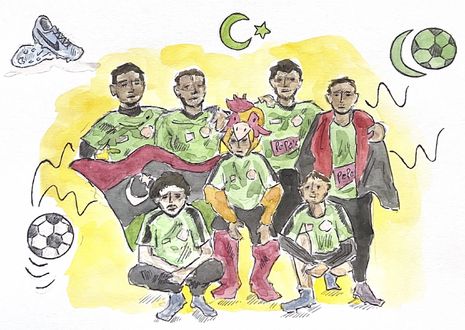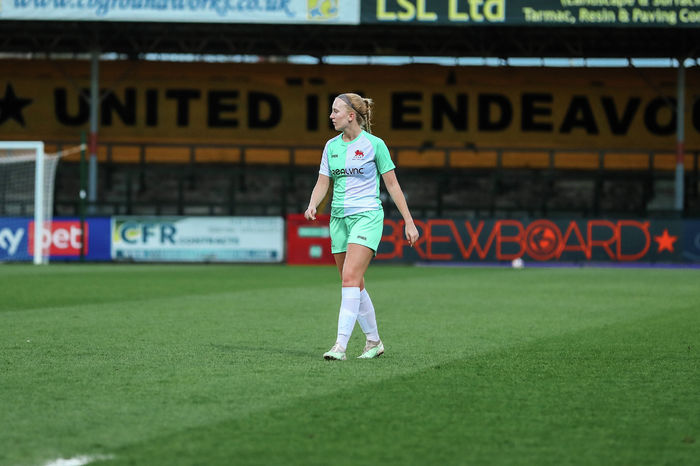CUISoc FC: Can spirituality find its footing in sport?
Alisha Mafaas sits down with the captains of CUISoc FC to talk about the club’s sporting success and its religious foundations

Fuelled by tea and biscuits, I sat down with Yusuf Izhac and Ashruf Guenaoui, former and current captains of the Cambridge University Islamic Society Football Club. Having just spent the evening watching several Premier League matches in the Sidgwick Prayer Room, they were in a perfect mood to discuss all things faith and football.
Each Friday, after standing together in congregational prayer, the team sits over lunch to discuss the team sheet for the weekend before reconvening at 10 pm for practice at Kelsey Kerridge. This tradition of ‘Friday Football’ has been part of the CU Islamic Society for over 15 years, which is why Yusuf knew that establishing a formal football team would be immediately popular when it was first proposed in 2023.
Initially, he had held back from joining CUISoc FC in favour of trying out for his college team, but he soon came to terms with the barriers posed by ‘lad’ culture that might have prevented him from embodying the team spirit. Ashruf affirmed that drinking culture gave him little incentive to participate in college football aside from practicing the sport itself – there are tangible impacts on team dynamics if a player misses out on key moments of bonding after hours, with the risk of players becoming outsiders on their own teams. Whilst drinking culture does have its space in football, it is time to also embrace alternative cultural spheres within the sport.
“It is time to also embrace alternative cultural spheres within the sport”
The overlap of drinking culture with college sports has meant that for many, CUISoc provides a greater source of pride than their colleges. As such, the two captains have had no difficulty getting people involved. If anything, Ashruf has found it most challenging to divide game time between the sometimes 20 players who show up for each game (often unannounced, but never unwelcome).
The team has already made a cultural mark on the society itself, having recently set up a social media account (@cu_isocfc) to share their antics on Instagram. The initial idea was simply to create a time capsule full of match results and act as a point through which others can get easily involved. Since then, maintaining the page has become a group effort, as players and observers alike suggest new ideas for posts and ‘meme stats’ – the captain himself has been singled out for the ‘most scandalous goal claim’ and for the highest frequency of balls lost in the box! When asked if the social media page has contributed to an improved team spirit, Ashruf agreed wholeheartedly: “It makes it more fun for us.”
Every team has a defining characteristic, whether it be through college, subject, or culture. For CUISoc FC, their religion fills this void. It would not be unreasonable to assume that worship is set aside in sporting sessions. After all, what likeness is there between standing on a prayer mat and kicking a ball?
Yusuf clarified the parameters of worship in Islam: “We don’t, as Muslims, believe that [Islam] slots into one place – it diffuses through all parts of your life.” When it comes to CUISoc FC, worship manifests itself in a multitude of ways: as the players prepare to step onto the pitch, the captain reminds the team of their significant role in representing Islam through displays of good character – however trivial it may seem in the context of a football match. At half-time, they stand together in congregation to pray, in a sincere display of submission to God that (literally) grounds them, as they prepare for an exciting second half of football.
‘For CUISoc FC, spirituality encompasses so much more than the physical act of prayer’
These reminders of embodying the Islamic faith are not in vain either, as Ashruf confirmed that “it changes the mentality of the game.” Tensions can run high when it comes to football, even between teammates. Comparing his experience on CUISoc FC to other teams, having played the game since he was a child, he notes that it is rare to see a player berate his teammate for a mistake. At most, even the biggest of mistakes will become a friendly joke, with no desire to discourage one another, only to uplift with lighthearted banter.
In fact, Yusuf feels that football has even exemplified certain areas of his faith, making him more acutely aware of the potential to nurture positive characteristics through team sport. For example, knowing that despite rivalry and competition, suppressing one’s anger is a part of faith. So long as it acts as a vessel to actively reform one’s habits, playing football can become an act of worship in itself.
Seeing worship as something that can encompass more than standing in prayer or being in a particular setting is a gradual but gratifying process. Ashruf recounted the shift he experienced from initially treating the Sidgwick Prayer Room as a place exclusively for prayer to, now in his third year, one where he can also gather with friends and simply be at ease. Socialisation through religion, such as that through football, enables that process to happen: religion evolves from being just a part of your life to diffusing into everything you do.
Ashruf cannot help but feel pride when he sees his faith represented on the sporting stage. He recalls the pleasure he felt seeing the Moroccan men’s players bow down to God after their defeat to France in the FIFA World Cup in 2022 and the respect he felt seeing players choose not to promote alcoholic products.
When players are open about their faith, both on the pitch and online, fans are gradually enlightened to how religion truly presents itself. Yusuf explained that Islamophobia is “not usually rational”, meaning that being presented with statistics is less likely to change one’s opinion than having a religious friend or football player to positively refer to. Openness surrounding religious practices serves to suppress elements of prejudice.
At least within the confines of Division 5 in the CUAFL, it is clear that religion exists beyond the sidelines of football and that it doesn’t slot into just one space. For CUISoc FC, spirituality encompasses so much more than the physical act of prayer. It manifests itself in the friendships fostered between teammates and the respect shown towards one another, as well as in tangible reminders of representing one’s faith. Now is the perfect time to tune in and follow CUISoc FC on their journey through the leagues.
 News / Judge Business School advisor resigns over Epstein and Andrew links18 February 2026
News / Judge Business School advisor resigns over Epstein and Andrew links18 February 2026 News / Hundreds of Cambridge academics demand vote on fate of vet course20 February 2026
News / Hundreds of Cambridge academics demand vote on fate of vet course20 February 2026 News / Petition demands University reverse decision on vegan menu20 February 2026
News / Petition demands University reverse decision on vegan menu20 February 2026 News / CUCA members attend Reform rally in London20 February 2026
News / CUCA members attend Reform rally in London20 February 2026 News / Gov grants £36m to Cambridge supercomputer17 February 2026
News / Gov grants £36m to Cambridge supercomputer17 February 2026










